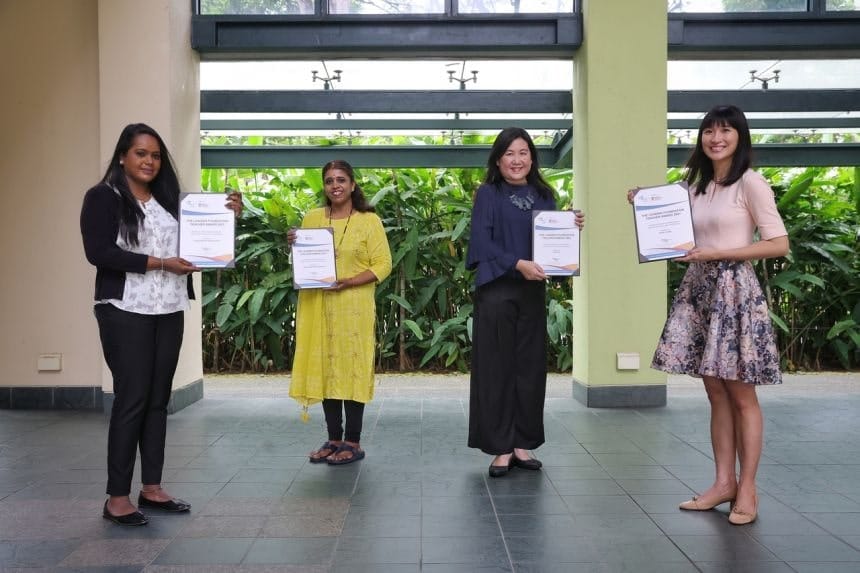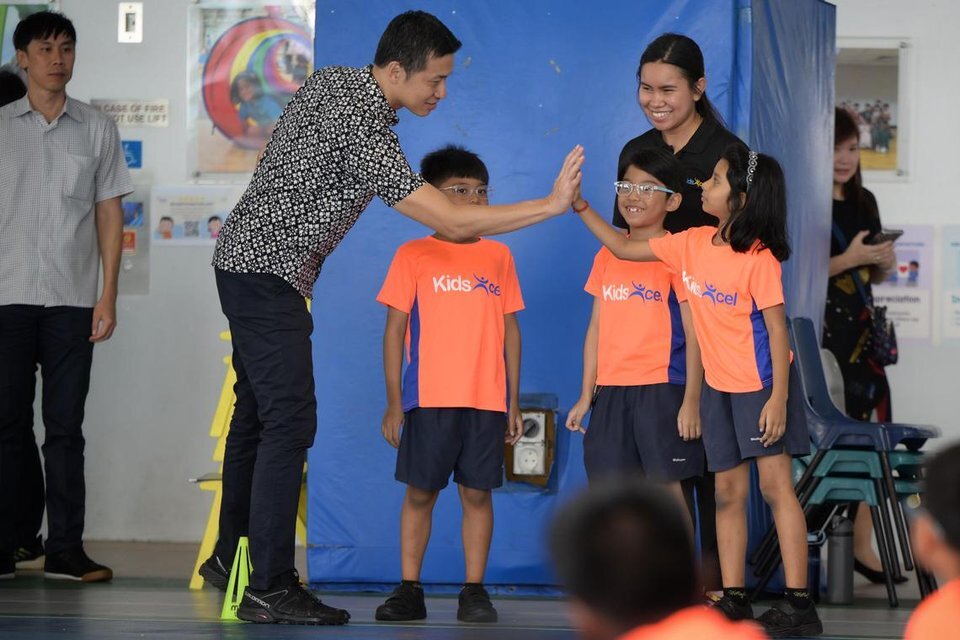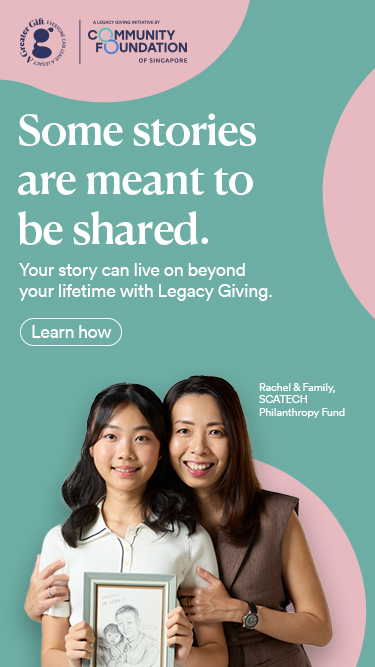Four teachers recognised for excellence in early childhood, special needs education


Ms Sulochanah Kanapathy’s pupil was already four years old but he could not say a word.
But Ms Sulochanah, 47, was determined to help, and taught the child with special needs to speak his first words.
The teacher from Ramakrishna Mission Sarada Kindergarten went the extra mile by conducting home visits, giving the child additional teaching materials, and training his parents to better manage his learning.
That incident from seven years ago drove her to take a course in special needs education to understand children with such challenges better.
On Wednesday (Nov 24), she received the Leading Foundation Teacher Award, in the Early Childhood Educator category, at the National Institute of Education (NIE) in Nanyang Technological University.
Besides Ms Sulochanah, Ms A. Neshanthini Neelamohan, 33, from Sparkletots Preschool @ Braddell Heights Block 246, also received the Leading Foundation Award in the same category.
Ms Wong Jia Min, 34, from Fei Yue Community Services and Mrs Lee E-Lyn, 47, from Methodist Girls’ School (Primary) received the Leading Foundation Award in the Special Needs Educator Category.
The Leading Foundation Teacher Award, established in 2013, recognises excellence in early childhood, special needs and allied educators who have made significant contributions to the well-being and teaching of their students. It is administered by NIE and the Community Foundation of Singapore.
The four were selected through appraisals and interviews by the judging panel, which comprised members from NIE, the Ministry of Education and the National Institute of Early Childhood Development.
This year, there were a total of 57 nominations.
Among the winners was Ms Neshanthini,who is a firm believer in ensuring that her lessons appeal to all types of learners.
There is always something for her pupils, be it visual, auditory or tactile. For instance, she often uses food essence to stimulate her pupils’ senses as part of sensory play, she said.
As for Ms Wong Jia Min, she believes parental support is key to a child’s development.
For example, Ms Wong brought in a professional sign language interpreter so that a student with behavioural issues could communicate more effectively with her deaf parents.
Many house visits later, Ms Wong and a social worker noticed a major positive change in the student’s behaviour.
Mrs Lee, on the other hand, uses humour in her classes to allow her students to express themselves and to feel relaxed in a safe environment.
For instance, she records the children’s voices and plays the recordings back during oral practice. She focuses heavily on celebrating small successes and encouraging them.
“I’m not just their teacher, but their cheerleader too,” she said.
The awards are sponsored by The Leading Foundation, which was co-founded by Mr Lim Siong Guan, a professor in the Lee Kuan Yew School of Public Policy, and a former head of the Singapore Civil Service, with Ms Joanne H. Lim, founder of a communications consultancy.
Mrs Jennifer Lim, Prof Lim’s wife and the guest of honour, presented the awards to the winners, who also received a cash award of $2,500 and a certificate each.
Winners list
Early Childhood Educator category
Ms A. Neshanthini Neelamohan, 33, PCF Sparkletots Preschool @ Braddell Heights Blk 246
Ms Sulochanah Kanapathy, 47, Ramakrishna Mission Sarada Kindergarten
Special Needs Educator category
Mrs Lee E-Lyn, 47, Methodist Girls’ School (Primary)
Ms Wong Jia Min, 34, Fei Yue Community Services
If you would like to begin your giving journey with us at CFS, please read more here
This article was originally published in The Straits Times here. Source: The Straits Times © Singapore Press Holdings Limited. Permission required for reproduction.
Ms Sulochanah Kanapathy’s pupil was already four years old but he could not say a word.
But Ms Sulochanah, 47, was determined to help, and taught the child with special needs to speak his first words.
The teacher from Ramakrishna Mission Sarada Kindergarten went the extra mile by conducting home visits, giving the child additional teaching materials, and training his parents to better manage his learning.
That incident from seven years ago drove her to take a course in special needs education to understand children with such challenges better.
On Wednesday (Nov 24), she received the Leading Foundation Teacher Award, in the Early Childhood Educator category, at the National Institute of Education (NIE) in Nanyang Technological University.
Besides Ms Sulochanah, Ms A. Neshanthini Neelamohan, 33, from Sparkletots Preschool @ Braddell Heights Block 246, also received the Leading Foundation Award in the same category.
Ms Wong Jia Min, 34, from Fei Yue Community Services and Mrs Lee E-Lyn, 47, from Methodist Girls’ School (Primary) received the Leading Foundation Award in the Special Needs Educator Category.
The Leading Foundation Teacher Award, established in 2013, recognises excellence in early childhood, special needs and allied educators who have made significant contributions to the well-being and teaching of their students. It is administered by NIE and the Community Foundation of Singapore.
The four were selected through appraisals and interviews by the judging panel, which comprised members from NIE, the Ministry of Education and the National Institute of Early Childhood Development.
This year, there were a total of 57 nominations.
Among the winners was Ms Neshanthini,who is a firm believer in ensuring that her lessons appeal to all types of learners.
There is always something for her pupils, be it visual, auditory or tactile. For instance, she often uses food essence to stimulate her pupils’ senses as part of sensory play, she said.
As for Ms Wong Jia Min, she believes parental support is key to a child’s development.
For example, Ms Wong brought in a professional sign language interpreter so that a student with behavioural issues could communicate more effectively with her deaf parents.
Many house visits later, Ms Wong and a social worker noticed a major positive change in the student’s behaviour.
Mrs Lee, on the other hand, uses humour in her classes to allow her students to express themselves and to feel relaxed in a safe environment.
For instance, she records the children’s voices and plays the recordings back during oral practice. She focuses heavily on celebrating small successes and encouraging them.
“I’m not just their teacher, but their cheerleader too,” she said.
The awards are sponsored by The Leading Foundation, which was co-founded by Mr Lim Siong Guan, a professor in the Lee Kuan Yew School of Public Policy, and a former head of the Singapore Civil Service, with Ms Joanne H. Lim, founder of a communications consultancy.
Mrs Jennifer Lim, Prof Lim’s wife and the guest of honour, presented the awards to the winners, who also received a cash award of $2,500 and a certificate each.
Winners list
Early Childhood Educator category
Ms A. Neshanthini Neelamohan, 33, PCF Sparkletots Preschool @ Braddell Heights Blk 246
Ms Sulochanah Kanapathy, 47, Ramakrishna Mission Sarada Kindergarten
Special Needs Educator category
Mrs Lee E-Lyn, 47, Methodist Girls’ School (Primary)
Ms Wong Jia Min, 34, Fei Yue Community Services
If you would like to begin your giving journey with us at CFS, please read more here
This article was originally published in The Straits Times here. Source: The Straits Times © Singapore Press Holdings Limited. Permission required for reproduction.
- Related Topics For You: ACCESSING QUALITY EDUCATION, CHARITY STORIES, DONOR STORIES, INCLUSIVITY & INTEGRATION, NEWS, PERSONS WITH DISABILITIES

.jpg)

